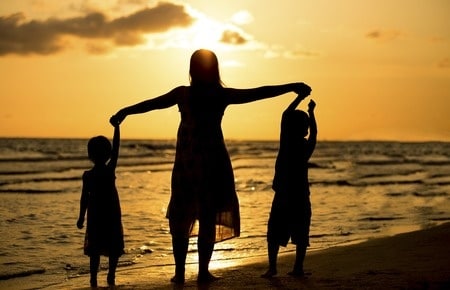by Mina Simhai
Today, hopelessness rode in my backseat, but only for a moment. The face of hopelessness had soft auburn curls and bright hazel eyes, and carries my heart with her wherever she goes. The face of hopelessness was my often-bubbly 5-year-old daughter.
This afternoon, we saw Zootopia. I worried on the drive home that the movie, which is both scary and inspirational, might have been too much for my little sweetheart. As I drove and we chatted, I heard my daughter’s voice cracking, the way it does when she’s on the verge of tears. Gently, I said something like, “What’s on your mind?”—expecting to hear about snarling, ferocious animals. Instead, she replied, “I just want to be like Officer Hopps, on stage talking in front of lots of people, and I don’t know how to do it.” (Judy Hopps is the first rabbit officer in the Zootopia Police Department.)
My jaw dropped. It wasn’t fear but frustration that was upsetting my little girl. She had a goal and desperately wanted to believe that 1) she had the power to achieve it and 2) she could figure out how to get there.
I faltered my way through a story of how I got to speak at my high school graduation because I did well in school. My bumbling attempt at instilling hope did the trick. After depositing her Mary Janes in her mudroom cubbie, she darted upstairs to stand on her bed and practice her speech. She practiced until dinnertime and gave her speech to the family after dinner.
Reflecting on this, I see how the “hope cycle” Shane Lopez describes in Making Hope Happen: Create the Future You Want for Yourself and Others played out for my daughter. The three components of the cycle are goals, agency, and pathways.
Goals
According to Lopez, the goals that matter most to us are the ones that build hope. Some of our goals are fleeting and quickly forgotten, and others we modify over time. Looking back, I realize that this is not the first time my daughter has expressed her desire to be a public speaker. Since she was two, she’s loved being on stage. In the fall, she had an opportunity to see Hillary Clinton speak. Afterwards, she said, “I want to be like Hillary Clinton, because people listen to her when she talks.” She enthusiastically attended the acting class we signed her up for. Learning about Martin Luther King fascinated her, and she listened with interest to his entire “I have a dream” speech on Martin Luther King Day.
Maybe this isn’t the fleeting goal of a child, but something she’s been mulling over for months or years. Maybe it’s time we start paying attention.
For many of us, the important goals are the ones that keep showing up until we heed them. When we realize that there are many paths towards our goals, it becomes easier to shift from wishing to building hope and authoring our own lives.
Agency
Agency, Lopez says, refers to our “perceived ability to shape our lives day to day.” When we practice agency, we take responsibility for moving towards our goals, and we know we can make things happen. A perceived lack of agency upset my daughter in the car. She had a clear goal, but she didn’t feel that she could march towards it. Now I see why parenting books say it’s important that we let our kids make their own decisions, participate in work around the house, and learn how to problem-solve on their own—starting with little things like how to share the blocks. These small steps gradually build a sense of agency.
Agency is equally applicable to adults. Feeling that we can create the future we want builds momentum, which Lopez believes is necessary for attaining hope. When we feel that our actions matter, we can move towards our goals like a willow tree, staying rooted and grounded as our branches dance in the wind—rather than an old rickety tree whose limbs break off with each mighty gust or obstacle.
Pathways
The third element of Lopez’s hope cycle is creating pathways: searching for and forging multiple routes towards our end goal. Pathways allow us to monitor our progress over time. Having pathways also means we are aware of the obstacles that could arise, and we create paths around them. Building pathways means we have Plans A, B, and C.
Pathways for an aspiring 5-year-old public speaker could look like talking to successful public speakers and asking how they got there; treating her kindergarten show-and-tell as an opportunity to bring in something meaningful and practice speaking to and engaging with an audience; giving a toast or saying a blessing before meals (especially when we have guests); signing up for Model UN when she’s a little older; creating a podium where she can give speeches to her dolls and stuffed animals; and holding family meetings where everyone has time to talk without interruptions. I can encourage her as she identifies and pursues her interests and passions, and help her carve out time and space to practice.
Nexting
As a way to practice hope, Lopez gives us “nexting”—which simply means talking about what we will do next. When he writes about “nexting” with his 7-year-old son on the walk to school, he mentions conversations about the next movie they will see or the next basketball game his son will play. Through nexting, Lopez is finding out what upcoming events excite his son, what he looks forward to, and what goals are important to him. With that knowledge, they can plan next steps together, and Lopez can focus on helping his son feel more like an “agent” in his own life. As they identify the bigger goals and values through nexting, his son can take the lead, identifying paths for pursuing his goals.
Nexting, combined with the hope cycle (goals, agency, and pathways) offers us potent tools to create what Lopez calls a “compulsion to finish what [we] started,” which emerges from hope. So hope can make us gritty, and grit helps us achieve our goals. Now it makes sense when Lopez writes that hopeful people are more resourceful.
While we think of hope as a comfort in hard times, I never saw it as something that actually drives our behavior. Thanks to Lopez and Making Hope Happen, I now have a more nuanced understanding of the many ways in which hope helps us, how it drives us, why it pays to be hopeful, and ideas for cultivating more hope in myself and those I love.
Let’s explore hope and how we can build it together on our next book club call, Tuesday, May 10, at 7:30 pm EST.
Conference Call Dial in: 323-476-3997
Conference ID: 218555#
International callers click here: //yourconferenceline.com/local/
Mina Simhai earned her Certificate in Positive Psychology from the Wholebeing Institute, and served as a teaching assistant for CiPP4. She is also a recovering lawyer, yoga teacher and mother. Her latest project is bringing the tools of positive psychology to lawyers and others in the DC area and across the country. Her top strengths are judgment, love of learning, curiosity, love, and appreciation of beauty. Mina is an avid reader and looks forward to launching the WBI Book Club with you.











Thanks so much Mina, for this. It comes at a time when I really needed to hear it. I love that “hope” is not just a vague feeling, but something you can really work towards. And that you can help someone you love achieve things or goals in their life with these practical steps. Awesome!!!
Heidi, I am so glad that Shane Lopez’s work on hope is resonating with you. This idea that we can work towards hope can feel a bit radical at first, and it’s also rewarding to practice applying the steps in your own life and helping loved ones do the same. It would be wonderful to dive deeper with you on our book discussion call (feel free to join even if you haven’t read the book) on Tuesday May 10th 7:30 EST.
It’s on my calendar! Hope to talk with you soon!
Mina, I loved your Blog. You have a way of making the material so immediate and relevant with your use of stories. It was a wonderful illustration of the cycle. I find Shane’s work and especially this book so inspiring. I’m really glad that you are inviting us to speak with you further about his wonderful book and look forbad to being there with you on the call!
Thank you, Phoebe. I’m so glad that you can be on the call Tuesday night, I look forward to talking with you and others. The email exchange we had a few months back inspired the selection of this book for book club!
thank you! great blog. xo
Joy, I’m so glad you enjoyed the blog. It brought me a lot of joy to write it. Hope to have you on the book club call Tuesday May 10.
Great blog Mina…I love how you illustrate that the concepts are so accessible to us as adults and also to 5 year olds just starting out on their journeys!